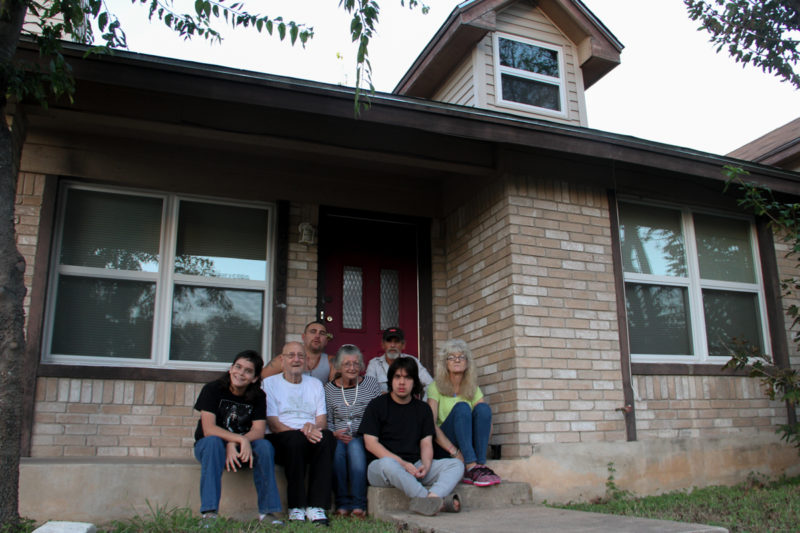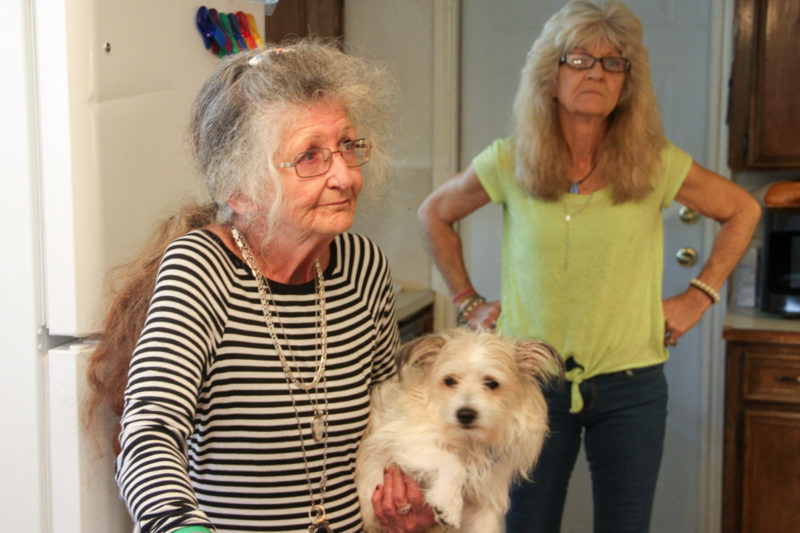Finding Temporary Housing Remains a Hurdle for Harvey Victims
By Omar Rodriguez-Ortiz
Photography By César López-Linares
Reporting Texas

The Thornhills live in a three-bedroom house in Del Valle along with their family and friends from Rockport who were also displaced by the hurricane. César López-Linares/Reporting Texas
Twyla and Jimmy Thornhill, their two grandsons and a friend hunkered down in their Rockport house, as Hurricane Harvey’s winds howled.
Things got worse when the eye of the hurricane passed over and Harvey’s force hit again.
“That’s when it lifted the roof. Everything started happening. The water started running down the inside walls,” said Mrs. Thornhill, 67.
They made it through the night. The next day, they were rescued from their flooded home and bused to Austin, finding refuge in a city shelter. Over the following weeks, they were moved to a second shelter, then to an Austin motel.
On Oct. 13 – seven weeks after Harvey hit Texas – Twyla Thornhill got the keys to a rental house in Del Valle. She cherishes the moment: For the first time in weeks, they had a place to call home.
Finding temporary housing has been one of the biggest challenges for Harvey evacuees. The Federal Emergency Management Administration has spent more than $1.8 million on hotel or motel rooms for Harvey victims, spokesperson Deanna Frazier said. As of early November, more than 49,000 evacuees still were living in 17,000-plus hotel rooms in Texas.
Frazier said the agency does not track people once they leave shelters or hotel rooms that FEMA pays for.
But about 26,000 more people are living with friends or relatives, making do in storm-damaged homes or even living in tents, according to a Texas Tribune report on a recent Texas House subcommittee hearing at which coastal mayors said short-term housing remained an urgent need.
The Thornhills illustrate the challenge. When they left the second Austin shelter, they moved into a motel near the airport. Five adults – including three friends from Rockport – and the two boys crowded into two rooms for weeks. They used a slow-cooker to make meals.
Twyla Thornhill cares for Ryan, 17, and William, 12, who have autism – making sure they shower, helping them dress, even cutting their hair. Their parents, her son and daughter-in-law, both are deceased.
The three-bedroom rental house is a tight squeeze. The kitchen appliances are old. The Thornhills are sleeping on air mattresses. Twyla and Jimmy, 79, have arthritis, and he uses a walker. It’s hard for him to get up and down from the mattress.

Twyla Thornhill (left) with her dog. The house is the first stable residence they’ve had since Harvey hit their hometown. César López-Linares/Reporting Texas
Their friend from Rockport, Caroline Herrera, 66, and her son Vincent, 38, who carried the Thornhills out of their flooded home, also live in the house, as well as Matthew Ayala, 60, who has cancer and lost his Rockport home in the storm.
Mr. Thornhill said he misses sitting on his front porch and listing with neighbors. But the couple may not go back to Rockport.
If there is any bright spot, it is that the Del Valle Independent School District is providing educational services for the boys that the Thornhills had not been able to find in Rockport. The boys registered at Del Valle schools while they were living in a shelter, and the district bus picks them up every morning.
“There is nothing (back) there for the children,” Mrs. Thornhill said.
“I got to think about them first and then us; they need special care. This is the first place I found that is able to offer that care,” she said.
As of late October, Del Valle ISD had 39 enrolled students affected by Hurricane Harvey. Many others had already gone back to their homes or someplace else with their families.
The Thornhills and both boys receive Social Security, and they are able to pay the rent. They house, the furniture and their medication are thanks in part to Integral Care, the Austin-Travis County authority that helps people with mental illness, substance abuse and developmental disabilities.
But the Thornhills still don’t have a permanent home. Their cinderblock house in Rockport was severely damaged; their daughter is living in a trailer in the yard.
Between 20 and 35 percent of Rockport residents have not returned since the storm, according to Patrick Rios, mayor pro tem.
“We hope to see an increase in people returning as more area businesses reopen and more temporary housing becomes available,” Rios said.
In spite of what the family has gone through, Mrs. Thornhill said it could have been worse.
“We could have nothing at all but we got each other. We got our lives and that’s what’s important,” she said.